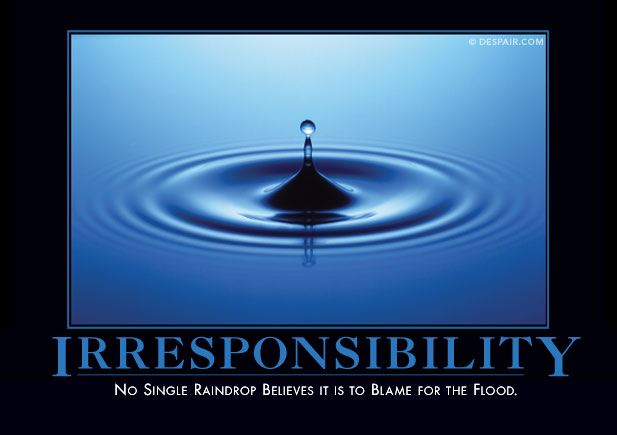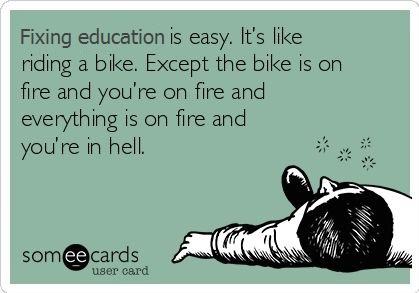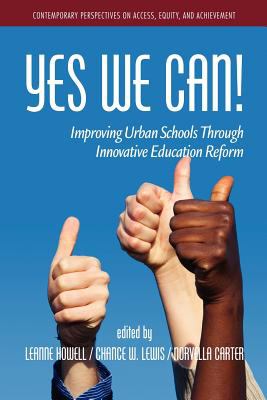
It probably seems to non-educators that teachers are a whiney lot. Every time the state or some money-loaded national organization starts talking about assessment or accountability, we seem to lose our collective minds. And #EdReform advocates are all too happy to fixate on what we’re doing wrong NOW, what’s we’re overlooking, neglecting, or misimplementing THIS TIME.
The Feds want to fix us, the State wants to punish and expose us, and even our districts sometimes seem determined to inflict upon us whatever’s trending in their administrative book study THIS semester.
Because kids aren’t learning, apparently. We quibble over what to assess and how to assess it, but the outcome is predetermined – THEY’RE NOT LEARNING THE IMPORTANT THINGS ABOUT THE ESSENTIAL STUFF or SKILLING THE STANDARDS by their DEVELOPMENTAL CHECKPOINTS.
Funny thing, though – the conversation rarely seems to include actually doing anything for all those kids who apparently aren’t learning while they’re with us.
They just never seems to come up.
That’s weird, right?
We set even ‘higher standards’. We create even gooder testiness. We wrangle with curriculums and cores and skills and assessments as if the fate of mankind rests solely on this year’s legislation and this season’s platitudinal tripe.
We grade the schools, VAM the teachers, threaten the administration, and mandate ALL THE SUCCESS! Surely if we just pass enough words in just the right combination, kids will learn! Bookoos and lots!
But what if they don’t? Then what? What do we do for the actual kids?
The ones who aren’t learning?
If we reformorize harder and more, the conviction goes, students will become globally college and career ready. But if they don’t, then what?

I don’t mean all the stuff you’re going to do to the schools or the teachers. I’m in Oklahoma – we’re short something like a thousand warm bodies statewide, so threatening our jobs is problematic at best. You don’t like the way I choose to teach my kids? Go right ahead – take whoever’s next in that long line of folks desperately wanting to work HERE.
Yeah, that’s what I thought.
But that’s still about what you’ll do to me, or to my boss, or to the institution reckless enough to give me a teaching degree. What are you going to do for all those kids who are apparently doomed due to my lack of competence? Have you considered… helping them in some way?
Since they’re so important to you? Your NUMBER ONE PRIORITY, if I remember your speeches correctly?

Holding them back isn’t much of a strategy. Unless we believe that most teachers out there are quite capable of doing the ‘good lessons’, but choose to keep them in reserve until merit pay or tougher accountability pry it out of them, running the kids through again isn’t likely to change much. The only difference the second time is we’ve officially labeled them ‘stupid’ to better motivate them.
Perhaps busting the unions – so that teachers finally have to put in a full six-hours worth of effort – free up students’ natural urge to master the prescribed curriculum. Or is that just more blaming?
I get that you want US to do it, but we’re doing it wrong, remember? So who’s stepping up now to do it right?
You know, for the kids?
Maybe it’s the curriculum itself – with just the right careful tweaking, like a cartoon safe-cracker, things will slot and the learning will be fully unlocked! THAT will help the children, because just LOOK at these eleventeen pages of content expectations!
But that’s still not helping the actual kids. Not even trying or claiming to, actually.

They’re just props in your melodrama. You trot them out from time to time anecdotally, but when they’re considered at all, it’s usually as receptors – passive predicates of whatever fixin’ we’re promoting.
But active players in the equation? Diverse entities with varying degrees of agency and a multiplicity of interests, gifts, and needs? That’s absurd. Messy. Intimidating as hell. And thus, not welcome in the discussion.
Are they tired? Up half the night working, or watching siblings, or maybe just playing video games until the wee hours of the dawn? What part of the school’s A-F ranking do you tweak to ensure the child gets a good night’s sleep?
Could they be worried because their family is a mess? Dad’s always gone and mom leans on them like they’re adults and should know what to do? Is that a ‘ticket out the door’ issue or a ‘call one parent every day with a positive report’ solution?
Maybe they’re not being brought up in a way that prepares them to succeed in school, so you offer them… ‘improved teacher training’ mandates? Maybe it’s poverty, or culture, or any of the other intimidating realities we want so badly to believe can be negated by a few good test scores. What part of that Gates Foundation money is going to address these? Or are you just going to keep blogging about how schools should be making more ‘real world connections’?

Maybe they don’t really care if they do well in school or not. Perhaps they’ve seen no evidence playing along with our system guarantees what they’d consider ‘success.’ Perhaps they’re unable to fear ‘failure’ in an age of teacher-blaming and extensive social safety nets. So, Mr. #EdReform – do we tackle that one by ‘flipping the lesson’ or by removing all of the desks? What cut score adjustment helps instill an essential level of ‘buy-in’ from pre-teens?
Maybe they’re just hungry, and not for what we’re serving. Maybe they’re distracted because their world is spinning out of control. Maybe they’re just bored, or confused, or angry, or sad. Maybe they don’t get it, and maybe they just don’t care. I assume that ‘intensive remediation’ you mandated will kick-start that ‘love of learning’ that’s lacking? Or would you pull their electives in order to solve their emotional issues before it hurts their GPA permanently?
Maybe they’re just dumb. How much merit pay fixes that, exactly?

It’s understandable we’d fixate on the lady with the big desk at the front of the room. She’s one of the few things in the equation we feel like we can control. So… she must be the problem. If not her individually, then as a representative of the system – the district, the training, the union to which she belongs.
As teachers, we buy into this far too easily because it’s our ethical obligation to constantly ask, “What could I be doing differently? What haven’t I tried? Where might I have messed up?” We do this because we can’t fix everything, but we can try to change what WE do, and how we do it.
But why is it the only people in the conversation focused on helping actual students are the teachers and administrators already condemned as stubborn remnants of a ‘failed system’? Does no one find it odd how little of the #EdReform conversation involves even trying to solve the problems holding back real students?
I don’t mean they’re not very good at it; I mean they don’t seem to even consider trying. Every solution is a variation of (a) helping a small percentage of chosen specials escape to ‘good’ schools, the rest be damned, or (b) prodding those of us already here to do it better, do it harder, do it different, do it right.
So here’s the chalk, here’s the textbook. Live it up, you pompous $#%&. Teach your heart out. Bind up their wounds and globally prepare them to your hearts content.
OR, shut the $%#& up.

I’m not trying to take teachers out of the equation, and I’m certainly not trying to pile blame on a bunch of pre-teens for problems they didn’t create. I’m not against improving or learning or changing how we do things.
But if we limit the conversation to clichés we can legislate, cost nothing politically or financially, require zero soul-searching on the part of the privileged classes, and make good sound bites for the uninformed multitudes, that’s not think-tanking – that’s bullsh*tting.
I’m not terrified of change. I’m tired of your manufactured policy drama and snarky, belittling commentary. I’m tired of national and statewide policies whose only function is letting rich little boys play hero advocate. Meanwhile, my students – my real, live, varied, needy students – aren’t even factors in your calculations.
You’re not actually helping. And, to be completely honest, you’re making my job even MORE difficult than it already is. You are not showing me the way; you are IN my way.
Wanna really help my kids? Move.

RELATED POST: What’s Next, #EdReform?
RELATED POST: 5 Bad Assumptions Behind Education Reform
RELATED POST: I Agree With Jay – Whiny, Lazy Teachers
RELATED POST: The Elevator is Broken





 A few years ago, in a fit of enviro-economic greenness, Wal-Mart started this thing where they didn’t turn on the lights or keep their stores tolerably warm or cool.
A few years ago, in a fit of enviro-economic greenness, Wal-Mart started this thing where they didn’t turn on the lights or keep their stores tolerably warm or cool. 
 I’ll spare you the intimate details, but suffice it to say we all knew damn well what a flushless urinal looked like, and this was not it. Them fancy mall pee-ers were devoid of water, nicely decorated and scented, and had little plastic things that did I-don’t-know-what, but left you feeling modern and fresh and I’ll tell you what.
I’ll spare you the intimate details, but suffice it to say we all knew damn well what a flushless urinal looked like, and this was not it. Them fancy mall pee-ers were devoid of water, nicely decorated and scented, and had little plastic things that did I-don’t-know-what, but left you feeling modern and fresh and I’ll tell you what. 



 I’m wrong quite regularly.
I’m wrong quite regularly. Perhaps this is my failure to communicate clearly. I can be a bit scattered and make all the wrong assumptions and it’s just… yikes.
Perhaps this is my failure to communicate clearly. I can be a bit scattered and make all the wrong assumptions and it’s just… yikes. Standards which those making the rules couldn’t pass even with preparation.
Standards which those making the rules couldn’t pass even with preparation.  If you question the validity or long-term value of this test, the North Koreans have pretty much already won – all thanks to YOU, the soft bigotry of low expectations outdated edu-relic hippie-who-destroys-the-future labor union drone.
If you question the validity or long-term value of this test, the North Koreans have pretty much already won – all thanks to YOU, the soft bigotry of low expectations outdated edu-relic hippie-who-destroys-the-future labor union drone.